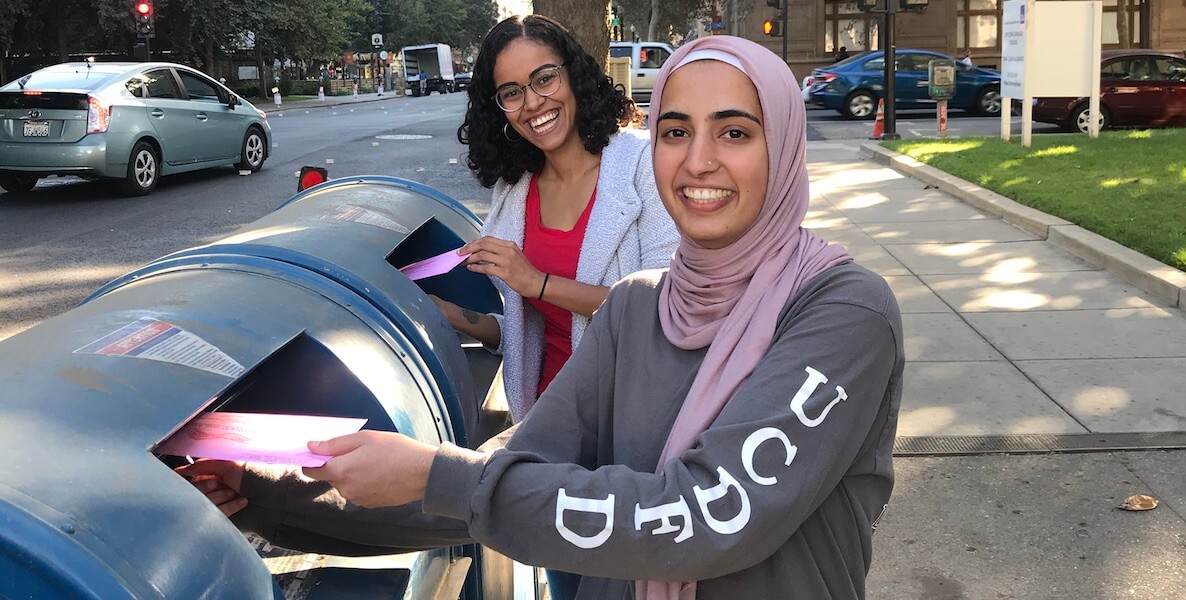In these deeply divided times, people may not be aware that since 1965, colleges and universities have been legally obligated under the Higher Education Act (HEA) to make good faith efforts to help students register to vote. Institutions are required to distribute mail or email voter registration forms to students. The nonpartisan federal statute applies to all institutes of higher learning in all 50 states, whether or not any individual state government sees it as advantageous for students to participate in the political process.
According to the American Council on Education (ACE), “A majority of young Americans say they are likely to vote in 2024. They will compose nearly one-fifth of the electorate, and 16 million Americans will have their first opportunity to participate in a presidential election. But recent polls identify an enthusiasm gap among young voters entering into the 2024 elections, and they may be less likely to actually cast votes in 2024 than they were in 2020.”
At the three regional public universities I led (two in red states; one in blue), we did everything possible to encourage voter registration and voting. We made it easy: Register for a course, and you’d also register yourself to vote. We trained students to be voter registrars for each other and the community. We participated in competitions with other campuses on numbers of registered voters. We regarded voter registration and voting as basic manifestations of citizenship, a key purpose of higher education.
The state of the college vote
Tragically, since 2020, 27 mostly red states, motivated by false claims of voter fraud, have deliberately made it more difficult for students to register and vote. According to the independent nonprofit newsroom The 19th,, a Republican judge in Tarrant County, Texas, attempted to reduce early voting on college campuses as a cost-saving measure. Although county officials rejected this effort, cost-saving has been used as an excuse in Texas and elsewhere. In Idaho, the state Supreme Court prohibited the use of student IDs for voter registration and in-person voting.
Thank goodness the Commonwealth of Pennsylvania is not deliberately trying to suppress the student vote. But even here, the PA residency rule, which requires people to live in their voting district for at least 30 days before election, can be confusing, especially to first-time voters. The vast majority of out-of-state students living on PA campuses clearly meet this requirement, since their academic year began in late August — more than 30 days before November 5. Students also needlessly worry that voting with their campus address will affect their ability in later elections to vote from home. They need to know that all they have to do is to change their registration for the next election to their home state.
College students have a choice between their Constitutional right to vote where they are residing while attending college, or registering and voting in-person or by absentee ballot (if available) in their home state. Universities should help students choose and implement that choice immediately and recommend downloading the National Mail Voter Registration Form.
Student voting in Philadelphia
It’s especially important this year for Philadelphia-area colleges and universities to actively provide students with voter information and do everything possible to get them to the polls. In fact, according to the HEA, it’s obligatory that campuses demystify and simplify the voter registration and voting process.
In the Philadelphia area, most campuses are already encouraging registration and voting. But there’s even more they can do. Thanks to student advocacy, for example, Drexel University and Temple University Law School this year will cancel all classes on November 5 to make it easier for students to cast ballots and participate in civic engagement.
Young Americans will compose nearly one-fifth of the electorate, and 16 million Americans will have their first opportunity to participate in a presidential election.
There’s a special need this year for additional poll workers because of the pressure placed on these poll workers in 2020.The experience of working at the polls will go a long way to making students into “super voters,” a term used to describe people who vote in every election, local as well as national. I know from my experience as a university president that elected officials keep lists of these super voters and do their best to influence them.
At most campuses students are now registering for spring classes. Make voter registration automatic for Pennsylvania students and inform out-of-state students of their rights.
This year it’s especially important to provide guidance to students living on campus who wish to vote in their home states and may be confused about the new rules. Some states have shortened timelines for absentee ballots and require the physical submission of a passport or birth certificate as proof of citizenship. Now more than ever, ballots everywhere are being rejected because of unintentional mistakes. Beyond the helpful get-out-the-vote activities of Young Democrats and Young Republicans on campus, university faculty and staff should without delay help students navigate the voter registration and voting process. Doing so is not partisan; it’s American.
Elaine Maimon, Ph.D., is an Advisor at the American Council on Education. She is the author of Leading Academic Change: Vision, Strategy, Transformation. Her long career in higher education has encompassed top executive positions at public universities as well as distinction as a scholar in rhetoric/composition. Her co-authored book, Writing In The Arts and Sciences, has been designated as a landmark text. She is a Distinguished Fellow of the Association for Writing Across the Curriculum. Follow @epmaimon on X.
![]()





